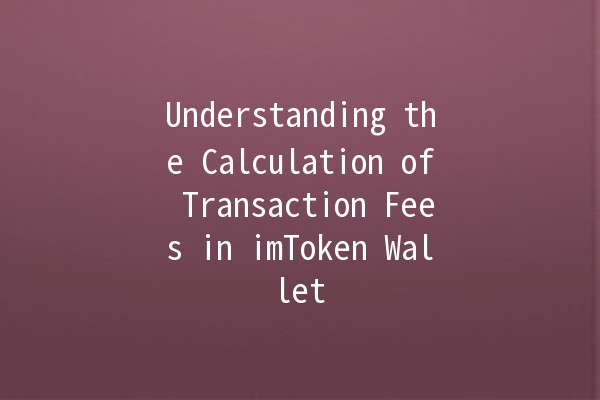The world of cryptocurrencies has grown tremendously over the last decade, drawing millions of users into the space. As a popular digital asset wallet, imToken plays a pivotal role in facilitating transactions, allowing users to manage their cryptocurrency holdings seamlessly. However, many users often wonder: how are transaction fees calculated in imToken Wallet? This article provides an indepth analysis of the various factors influencing transaction fees, along with practical tips to optimize your transactions and enhance productivity when using the imToken Wallet.
Transaction fees refer to small amounts paid to network validators or miners who confirm and process transactions on a blockchain. In the context of imToken, these fees can vary based on several factors, including network congestion, the cryptocurrency being used, and the transaction's size. Understanding these fees is vital for users looking to make the most out of their digital asset transactions.

Below are five practical tips designed to help users optimize transaction fees when using the imToken wallet:
Monitoring the current network conditions can provide insights into when it is best to make transactions. Tools like EthGasStation for Ethereum or similar platforms for other cryptocurrencies show current gas prices, which can help you determine the optimal time for your transaction.
Example: If you notice that the gas prices are unusually high during a specific time of day, consider scheduling your transactions during offpeak hours to save on fees.
In imToken, users can set custom transaction fees. If you are not in a hurry, consider lowering your transaction fee, which can significantly reduce costs, especially during periods of low network demand.
Example: Setting your Ethereum transaction fee to a lower value during low network activity might mean a longer wait time, but it could save you considerable funds.
Layer 2 solutions, such as Polygon or Optimism for Ethereum, offer reduced fees and faster transaction times. Check if the tokens you are using support Layer 2 scaling solutions via imToken.
Example: Switching to a Layer 2 solution for your transactions can lower your costs compared to standard Ethereum transactions during high usage periods.
Keeping your imToken wallet updated ensures that you have access to the latest features and optimizations, which may help reduce transaction fees. New updates may provide improved transaction options that can lead to better fee management.
Example: After an update, you might find features that allow you to automatically choose the best gas price for your transactions.
Understanding the difference between standard transactions and those requiring smart contracts can help you choose the right one to minimize fees. Standard transactions often have lower fees compared to complex smart contract interactions.
Example: If you only need to send tokens, use a standard transaction instead of a transaction that executes a smart contract function.
Transaction fees in imToken are determined by the cryptocurrency network you are using, the current network conditions, and the settings configured in your wallet. Depending on these factors, fees may vary significantly.
Transaction fees are generally variable and fluctuate based on realtime network congestion and other parameters related to the blockchain. Users can select their fees based on the urgency of their transactions.
Yes, imToken allows users to adjust net transaction fees. You can opt for higher fees for quicker confirmations or set lower fees for cost savings during low network activity.
imToken supports multiple cryptocurrencies, including Ethereum, Bitcoin, and many tokens based on these blockchains. Each has its own fee structure, so it’s important to check the specifics for each cryptocurrency.
imToken provides a transparent view of your transaction fees in the wallet interface. By reviewing your transaction history, you can see the fees paid for each transaction and adjust accordingly for future transactions.
If you do not set a transaction fee, imToken will typically apply a default fee. However, this may result in longer processing times, especially during periods of high network congestion when miners prioritize higherfee transactions.
Understanding and calculating transaction fees in imToken Wallet is crucial for optimizing your cryptocurrency transactions. By staying informed about network conditions, setting custom fees, relying on Layer 2 solutions, and regularly updating your wallet, you can significantly reduce costs and improve your overall experience. By implementing these strategies and tips, you not only save money but also streamline your processes, making your interaction with the blockchain more efficient and userfriendly. Whether you're a seasoned investor or a new user in the cryptocurrency realm, mastering transaction fees can lead to significant savings and a better understanding of the imToken ecosystem.